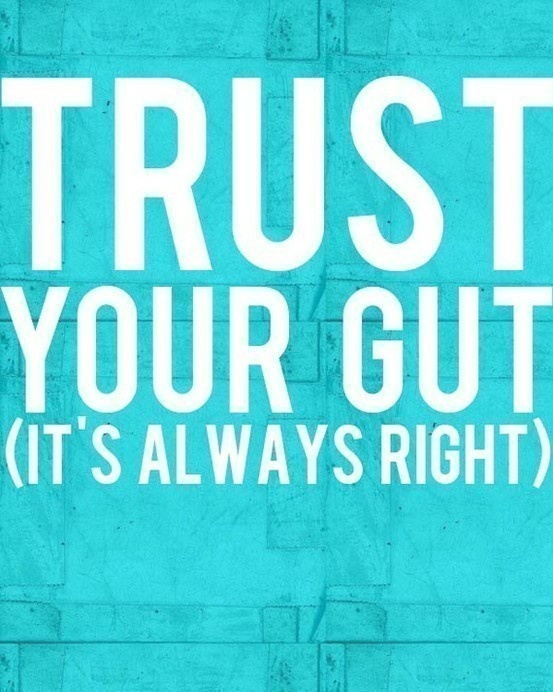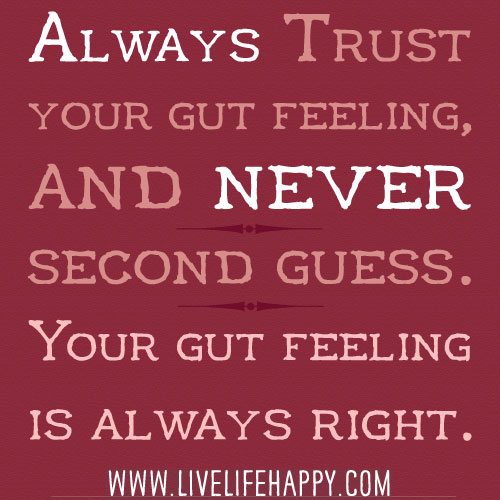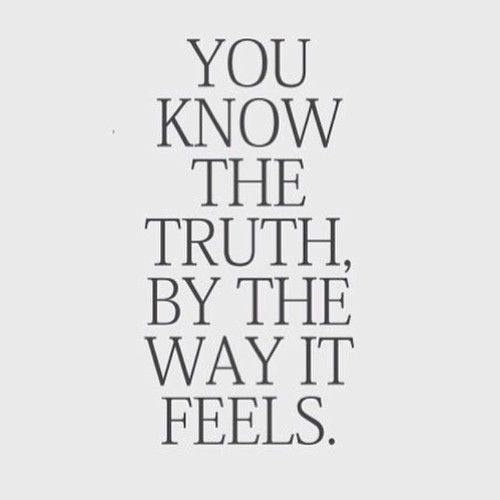Spiderman
Veteran Member




So there are so many quotes that glorify the idea of listening and trusting in what your gut tells you and that it doesn't lie. This may even be popular opinion. Yet this has repeatedly been proven false and dangerous...so why are there so many famous quotes in praise of trusting your intuition? Well...like many things...you can find just as many quotes saying something is good as you can find touting it as evil.
But one reason why we want to have faith in our inner feelings is because it is wishful thinking. How beautiful a world we would live in if nobody's gut ever lied to them? It would solve almost all of our problems. Also, everyone wants to be self-sufficient and secure. Nothing makes a person feel more self-sufficient and secure than to believe that their gut and feelings never lie to them.
"Trust your instinct, we’re urged; it’s never wrong. Nice platitude. It makes us feel safe. But gut instinct is based in our knowledge and experience. Thus, it’s inevitably limited to our specific perceptual frame.
Cognitive research has found that the formation of a perceptual frame involves two primary avenues for processing information. Some moves through rational channels and some through intuitive channels. Intuition is aligned with automatic,subconscious judgment, which can be highly influenced by emotion. It’s fast, and its conclusions arrive without analysis. Thus, it’s vulnerable to personal biasand error.
In other words, just because an idea feels does not make it right.Gut instinct, while useful, can also form a threshold diagnosis that becomes an immovable anchor, thwarting full analysis.
I came across the website of J. Scott Hornoff, who’d once been convicted of murder. He spent more than six years in prison before being exonerated, and he’s writing a book about his ordeal. What’s unique about his tale is that he was a detective himself. Like his fellow officers, he’d once trusted his gut. But then he discovered that his accusers’ gut instinct about him had been dead wrong.
I asked him to say a few things about his ordeal and what he’d learned. Here’s what he wrote:
“Imagine being innocent and being accused of a crime you did not commit. Imagine that you can choose the detectives who are looking at you as a potential suspect. Would you rather someone be guided by logic and facts or by feelings when deciding your fate? There are no witnesses placing you anywhere near the scene of the crime. There is no physical evidence linking you to the crime.
“Spiritualists and others who make a living advocating for following your inner voice will often tell you that by doing so you will lead a more peaceful life that is less at odds with universal energy.
"Cops are most often associated as ones who follow their gut or the tingle down their spine when investigating a criminal complaint; however, this course of analysis can often cause the investigator to ignore facts, and result in her beliefs forcing every shred of speculation and conjecture to fit the crime.
“Mary Ellen O’Toole, a former FBI profiler who worked on the Unabomber, Green River killer and other cases, discovered that some of the most vicious serial killers acted as the most harmless, and that many investigators had dismissed suspects using their gut feelings, believing the man they were evaluating was a good guy.
“I, too, have felt the negative effects of investigators’ gut instincts. Whether their intuition was initially based on a dislike or other prejudicial feelings, I was indicted, tried, convicted of first-degree murder and sentenced to life in prison for a crime I did not commit. I spent 6 1/2 years wrongfully imprisoned before the one responsible came forward and confessed.
“At the beginning of my ordeal in 1989, I was a city police detective working in Warwick, Rhode Island. I had been unfaithful with a woman who was murdered in my city. I understood why I was questioned; however, I requested and passed a polygraph examination. My clothes were not seized and examined. My vehicle was not processed.
"I agree that I was eliminated without a thorough investigation, but I wasn’t directing the investigation, and I was grateful when I was told I was no longer a suspect.
“Three members of my department who still suspected that I was guiltysought out the RI Attorney General’s Office, which appointed the RI State police to investigate me rather than the murder. There was no friendshipor respect between the three Warwick investigators and me and my brother, also a Warwick cop. Perhaps this influenced their gut feelings that I was guilty. The state police investigators were placed in a difficult position, but immediately assumed I was guilty.
“According to the National Registry of Exonerations, there have been over 1,000 exonerations in the United States. The Innocence Project proves the innocence of roughly 24% of those they represent when DNA exists, is properly preserved, and testing is granted. With 2.3-2.6 million people incarcerated in America’s prisons and jails, it’s fairly safe to believe that thousands of innocents languish in jail for crimes they did not commit.
"Perhaps and investigator’s perceptions and judgments of others is the actual main cause of wrongful imprisonment.”
Trust Your Gut? Not So Fast | Psychology Today
It isn't studies like that so much as what I have witnessed repeatedly in my own life that convinces me that all these quotes about trusting in one's gut are very false and even dangerous.
bigotry, especially fear of certain races or genders, is fueled by intuition and gut feelings.
this is also what fuels various psychological disorders including paranoia and irrational crippling phobias and cynicism.
countless people have lived their lives in fear and in prison to their gut feelings and some of these people have ruined other lives based upon their gut feelings and intuition.
"a life lived according to the feelings of your guts is a life half lived." fear ruins countless lives and ruins countless relationships, starts many conflicts, and is the number one thing that holds people back from achieving their dreams.
feelings in the gut can be very deceptive and destructive, not to mention extremely unstable and inconsistent. I have been in many situations where the feelings in my gut are my biggest enemy. They tell you a threat and danger is present that doesn't exist which can lead to extreme consequences!
Last edited by a moderator:
